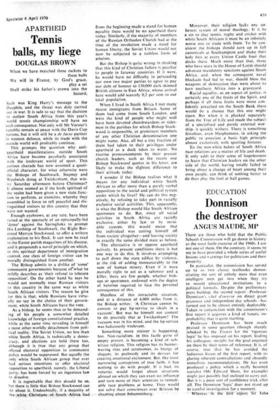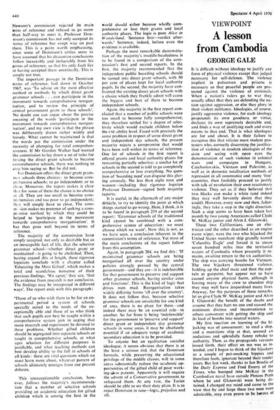EDUCATION
Donnison the destroyer
ANGUS MAUDE, MP
There are those who hold that the Public Schools Commission will go down in history as the most futile exercise of the 1960s. I am not one of them. On the contrary, it seems to me to have provided a whole series of useful lessons and warnings for politicians and their posterity.
In particular, the commission has served up to us two classic textbooks demon- strating the sort of unholy mess that even intelligent men get into when they try to mould educational institutions to a political formula. Despite the preliminary press buildup. the second report—Professor Donnison's chef d'oeuvre on direct grant grammar and independent day schools—has turned out to be almost entirely deplorable. Taken in conjunction with the commission's first report it acquires a kind of lunatic im- probability that is quite startling.
Professor Donnison has been much praised in some quarters (though sharply rebuked by the Times) for the 'rigorous logic' he has imposed on his report, leading his colleagues straight for the goal enjoined on them by their terms of reference. It is, of course. true that he has avoided the ludicrous fiasco of the first report, with its glaring inherent contradictions and absurdly unrealistic recommendations. He has even produced a policy which a really besotted socialist (Mr Edward Short. for example) might just possibly feel inclined to carry out. But it is a poor sort of confidence trick after all. The Donnison 'logic' does not stand up to careful investigation for a moment.. . Whereas'A the Mir **oil 'Sit 'oho
Newsom's commission rejected its main term of reference and refused to go more than half-way to meet it, Professor Don- nison's commission has not only accepted its terms of reference but swept way on past them. This is a point worth emphasising, since some of Donnison's critics seem to have assumed that his draconian conclusions follow inexorably and ineluctably from his terms of reference, so that his only fault lies in having accepted them uncritically. This is simply not true.
The important passage in the Donnison terms of reference, laid down in October 1967, was `To advise on the most effective method or methods by which direct grant grammar schools . . . can participate in the movement towards comprehensive reorgan- isation, and to review the principle of central government grant to these schools'. No doubt one can argue about the precise meaning of the words 'participate in the movement towards comprehensive reorgan- isation', and my own view is that the phrase was deliberately drawn rather widely and loosely. What cannot be maintained is that the words put the commission under the necessity of plumping for total comprehen- siveness. If Mr Gordon Walker had wanted the commission to lay down a set of rules for forcing the direct grant schools to become comprehensive schools, there was nothing to stop him saying so. But he did not.
Yet Donnison offers the direct grant gram- mar schools three choices: to become com- prehensive schools; to go independent; or to close. Moreover, the report makes it clear that for some of them the choice is no choice at all. They are too small to become com- prehensives and too poor to go independent; they will simply have to close. The com- mi• sion makes no pretence of seeking a com- promise method by which they could be helped to 'participate in the movement towards comprehensive reorganisation'. It has thus gone well beyond its terms of reference.
The majority of the commission have simply accepted, not only as desirable but as an inescapable fact of life, that the selective grammar school—whether direct grant or maintained—is going to be abolished. Then, having argued this at length, these rigorous logicians conclude with a chapter called 'Educating the Most Gifted', which makes a total and scandalous nonsense of their previous findings. 'We agree,' they say, 'that the evidence from research is not conclusive. The findings may be interpreted in different ways'. The report ends with this paragraph: Those of us who wish there to be for an ex- perimental period a system of schools specially suited to the needs of the ex- ceptionally able and those of us who think that such pupils can best be taught within a comprehensive system join in urging that more research and experiment be devoted to these problems. Whether gifted children should be segregated into separate schools or taught in comprehensive schools, at what ages selection for different purposes is justifiable, and what teaching methods can best develop ability to the full in schools of all kinds: these are vital questions which we must learn more about, whatever pattern of schools ultimately emerges from our present debates. •
This unexceptionable conclusion, how-, ever, follows the majority's recommenda- tion that a number of selective schools providing an academic education for gifted children which is among the best in the world should either become wholly com- prehensive or lose their grants and local authority places. The logic is pure Alice in Wonderland. 'Sentence first—verdict after- wards.' Sentence, indeed, before even the evidence is available.
Perhaps the most remarkable demonstra- tion of the majority's muddle-headedness is to be found in a comparison of the com- mission's first and second reports. In the first, the majority recommended that the independent public boarding schools should be turned into direct grant schools, with 50 per cent of places kept for local authority pupils. In the second, the majority have con- fronted the existing direct grant schools with a choice which they frankly admit will cause the biggest and best of them to become independent schools.
Again, the majority in the first report con- cluded that a number of public schools were too small to become fully comprehensive; they therefore settled for a degree of selec- tivity which would exclude children below the CSE ability level. Faced with precisely the same problem in respect of some direct grant and independent day schools, the present majority rejects a compromise that would have been well within its terms of reference. One lot of schools in the first report is offered grants and local authority places for remaining partially selective; a similar lot of schools in the second is told to go completely comprehensive or lose everything. No ques- tion of 'boarding need' can disguise this glar- ing anomaly. No less than eight men and women—including that rigorous logician Professor Donnison—signed both majority reports.
It is useful, in the aftermath of any major debacle, to try to identify the point at which things started to go wrong. Here, I think, it is to be found in paragraph 259 of the second report: 'Grammar schools of the traditional kind cannot be combined with a com- prehensive system of education: we must choose which we want'. Now this is not, as we have seen, a conclusion inherent in the commission's terms of reference. Yet most of the main conclusions of the report follow from this assumption.
Again, in paragraph 204, we find this: `If maintained grammar schools are being reorganised all over the country under policies strongly pressed by the central government—and they are—it is indefensible for that government to preserve and support other grammar schools, having similar aims and functions'. This is the kind of logic that drives men mad. Reorganisation takes widely differing forms 'all over the country'. It does not follow that, because selective grammar schools are unsuitable for one kind of area, there is no place for them—and indeed there may be an essential role—in another. So far from it being 'indefensible' for the government to 'preserve and support' direct grant or independent day grammar schools in some areas, it may be absolutely essential if an adequate range of academic secondary education is to be provided.
To anyone but an egalitarian socialist ideologue, it seems obvious that there is at the least a serious risk that the Donnison formula, while preserving the educational privilege of the middle classes, will in some areas substantially reduce the academic op- portunities of the gifted child of poor work- ing-Glom parents. Apparently it will require the advent of a Conservative government to safeguard them. At any rate, the Tories should be able to see their duty plain. It is to reject Donnison in rota—logic, prejudice and all.



































 Previous page
Previous page